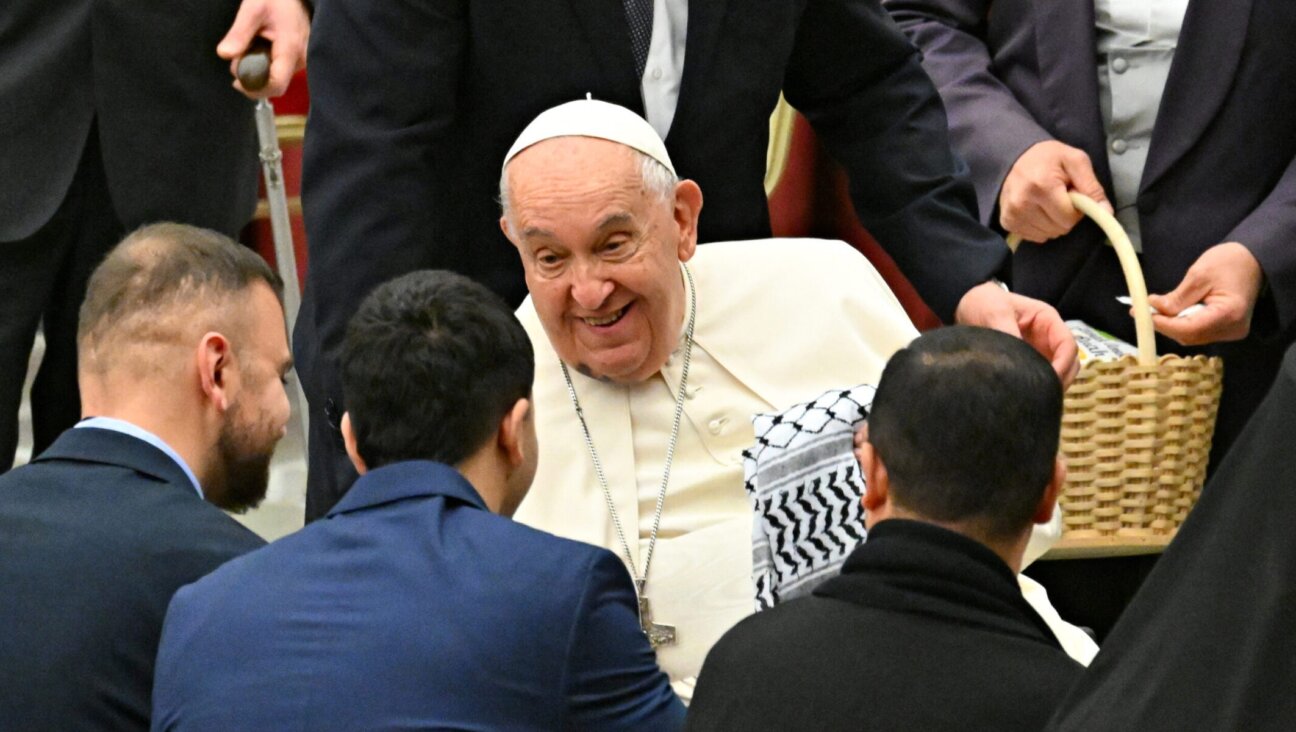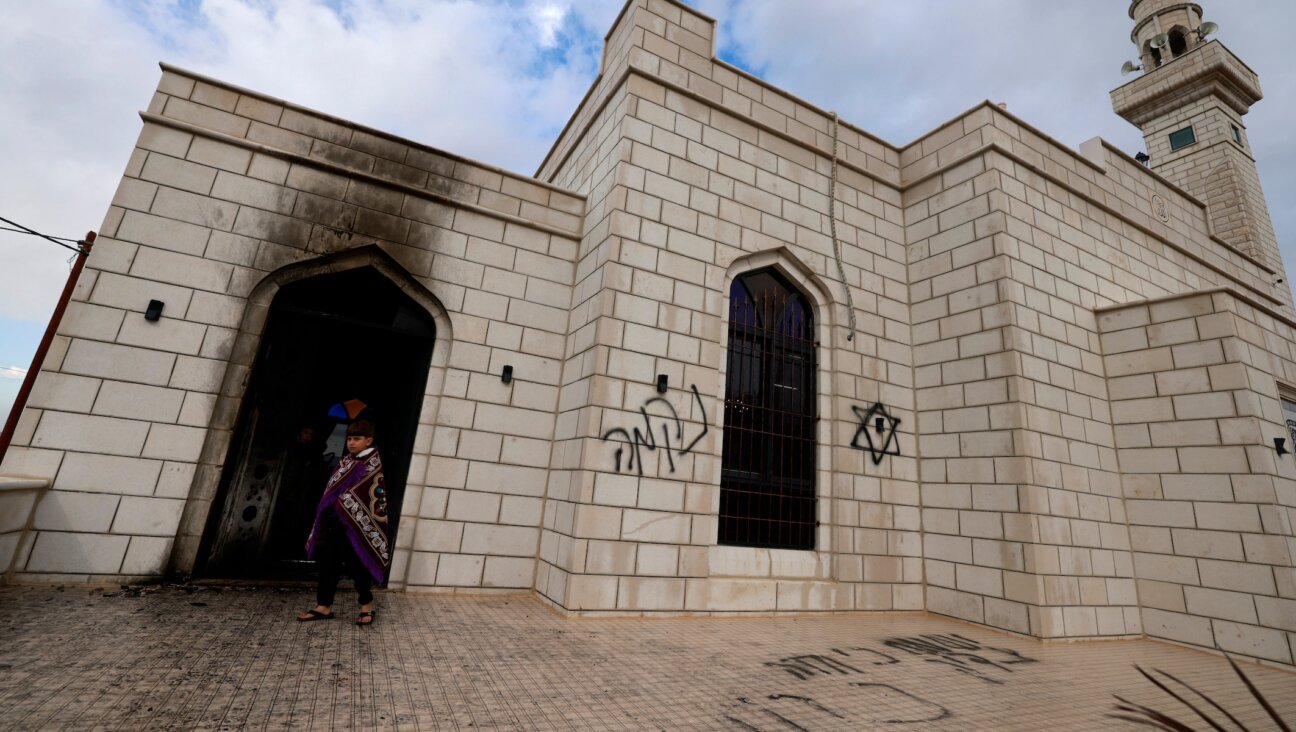Debates on Gays Link Anglicans, Conservative Jews
Debates over homosexuality have produced national headlines throughout the summer, with much of the attention focused on the Episcopal Church and its groundbreaking decision to appoint an openly gay bishop, V. Gene Robinson.
Yet an equally impassioned debate is raging within Conservative Jewish circles, as its top law-making body, the Committee on Jewish Law and Standards, gets set to revisit the movement’s ban on same-sex unions and gay and lesbian rabbis. The decision, members of the law committee said, will come down to the fundamental question of whether to uphold the historical understanding of the biblical prohibition against homosexual sex.
This is not the first time that Episcopal and Conservative Jewish leaders are debating the same contentious societal issue at the same time, along similar ideological fault lines. A generation ago, the two movements found themselves wrestling with women’s issues as the nation debated the need for an Equal Rights Amendment. The church ended up approving the ordination of women in 1976; within several years, the Conservative movement’s Jewish Theological Seminary had agreed to start ordaining women.
The parallel developments should come as no surprise. Episcopalians and Conservative Jews occupy similar spots on the denominational spectrum within their respective religious traditions, with each group attempting to preserve ancient rites and rituals, while seeking to provide a model for integrating tradition and democratic ideals.
“I have a certain amount of empathy for what they are going through, because in both the Episcopal tradition and the [Conservative movement] we are trying to take tradition seriously and trying to take modernity seriously,” said Rabbi Elliot Dorff, a member of the law committee and one of the leading advocates for reversing the movement’s position on homosexuality. “The struggle over how you integrate modernity and tradition is very similar.”
The church’s appointment of Robinson was roundly criticized in some circles, with detractors accusing Episcopal leaders of sacrificing the tenets of their religious faith in the name of modern-day American liberalism. The view was summed up in an August 8 Wall Street Journal article by Katherine Kersten, a fellow at the Minneapolis-based Center of the American Experiment: “Episcopalians’ inability to defend core doctrine suggests that mainline American churches are losing their theological moorings and increasingly falling prey to the prevailing winds of secular culture.”
When voting to appoint a gay bishop, Episcopalian leaders were operating within the context of a global Anglican movement in which less than 5% of some 70 million members worldwide live in the United States. Large numbers of Anglicans live in societies that have taken minimal, if any, steps to provide equal rights to gays and lesbians. Not surprisingly, the vote to appoint Robinson was met with outrage in other parts of the globe, with some groups threatening to break from the Anglican Communion. By contrast, Conservative Judaism is largely a North American movement, with its 1.5 million followers in Canada and the United States constituting the bulk of its worldwide membership. As a result, law committee members are likely to have more freedom to weigh the issue within the American societal context.
Despite this freer hand, Conservative rabbis face a more daunting theological challenge, stemming from their conception of Judaism as a legal system based in rabbinic law, or Halacha, and dedicated to enshrining moral norms, rather than a religion guided by faith and personal conscience. Conservative rabbis pushing for change face the theological equivalent of a constitutional roadblock — a biblical verse that appears to ban homosexual relationships — and are also the inheritors of a millennia-old halachic tradition that provides no direct precedent for attempting to end the prohibition.
At the same time, while the halachic model makes it more difficult to enact changes, this legalistic framework also provides Conservative rabbis with a mechanism for approving reforms without a wholesale abandonment of ancient religious precepts. Rather than simply abrogate the biblical verses prohibiting homosexual behavior, many Conservative rabbis are pushing for a reinterpretation of the ban. If these rabbis have their way, the law committee will ratify an opinion that preserves the authority of these verses, but argues that they only apply to acts of forced sex and cultic sex. A key premise of this argument is that when the Torah and, centuries later, the Talmud were written, religious authorities had no conception of monogamous, homosexual relationships not linked to pagan worship.
Critics both within and outside of the movement will certainly dismiss such a move as nothing more than an intellectually dishonest legal maneuver, aimed at papering over a radical break with the Jewish tradition. Rabbi Joel Roth, perhaps the movement’s most respected arbiter of Halacha and preeminent “small-C” conservative, is an outspoken opponent of lifting the ban. “It would be a halachically indefensible step,” Roth told the Forward. Still, he added, “the theological nature of the Conservative movement will not have changed.”
Other opponents of change have taken a harder line. In a 1999 article, Dorff came under intense criticism from University of Toronto Jewish studies professor David Novak, who broke with the Conservative movement more than a decade ago and joined the more right-wing Union for Traditional Judaism. “[Dorff] seems to prefer the feel of tradition and its modes of discourse to its actual content,” Novak wrote in the religion journal First Things. “Like so many modern theologians, Dorff does not seem to recognize a God who says ‘no.’”
Novak argued that “a Judaism that accepts homosexual unions and is even willing to formalize them is so far removed from historic Jewish culture that it is doubtful it can survive with its Jewish identity intact.”
In many ways, this battle has been fought over the past 30 years, as the Conservative movement slowly moved to embrace gender egalitarianism. While the halachic issues were less problematic and the precedents for change were more apparent, the bottom line is that the Conservative movement repeatedly abandoned longstanding ritual restrictions on women, even ones viewed as biblical in origin when they were seen to conflict with modern notions of equality and justice.
Such an observation, however, does not undermine Novak’s claim that permitting homosexual unions would represent a radical break with the halachic tradition. But it does not necessarily follow that such a decision would signal the demise of the Conservative movement as a denomination dedicated to upholding rabbinic law, just as the introduction of women rabbis has not stopped the law committee from viewing Halacha as the guide for answering religious questions. A religious movement that sanctions same-sex unions but insists that these couples are obligated to keep the Sabbath and observe kosher dietary laws is a far different theological animal than a denomination, such as Reform Judaism, that ultimately leaves these decisions in the hands of individuals.
A message from our Publisher & CEO Rachel Fishman Feddersen

I hope you appreciated this article. Before you go, I’d like to ask you to please support the Forward’s award-winning, nonprofit journalism during this critical time.
We’ve set a goal to raise $260,000 by December 31. That’s an ambitious goal, but one that will give us the resources we need to invest in the high quality news, opinion, analysis and cultural coverage that isn’t available anywhere else.
If you feel inspired to make an impact, now is the time to give something back. Join us as a member at your most generous level.
— Rachel Fishman Feddersen, Publisher and CEO























